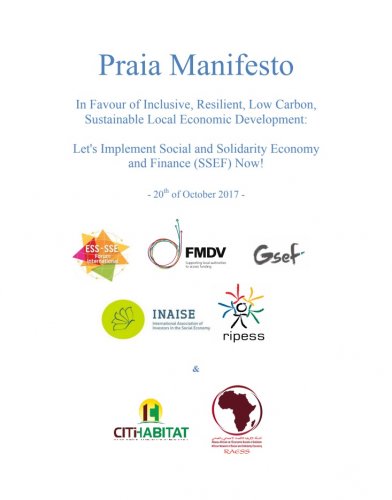The major international networks of Social and Solidarity Economy and Finance (SSEF) commit to an Inclusive, Resilient, Low Carbon and Sustainable Local Economic Development (LED).
Meeting in Praia, Cabo Verde, on the occasion of the 4th World Forum for Local Economic Development, the SSE International Forum, the Global Fund for Cities Development-FMDV, the Global Social Economy Forum-GSEF, the International Association of Investors in the Social Economy-INAISE, the Intercontinental Network for the Promotion of Social and Solidarity Economy-RIPESS, and their regional and local interlocutors, the African Network of the Social and Solidarity Economy-RAESS, and Citi-Habitat, commit to a transformative agenda for local economic development (LED) in our territories.
The joint motto: for Inclusive, Resilient, Low Carbon and Sustainable Local Economic Development (LED), Let’s implement a Social and Solidarity Economy and Finance (EFSS) now!
Download the Praia Manifesto here
For the first time, through a common text, the international networks are committed to proactive collaboration around a joint agenda, which will bring powerful actions until 2019.
“Jointly and separately, they have relays in many different countries and key sectors, and are thus in a position to propose methodologies and tools that are specific to SSEF, as well as engaging in and implementing actions to support national or local strategies of sustainable, responsible Local Economic Development in partnership with their allies and local actors.”
The Praia Manifesto takes stock of the historical cultural, institutional and legal advances that the SSEF has experienced in recent years. Economic and financial crises, climate change, new international “transformative” agreements, laws and public policies deployed by many countries, cities and regions, citizen mobilizations, the advent of new technologies, revalorization of disruptive and resilient SSEF innovations: so many factors today to achieve the metamorphosis of our systems of consumption, production, capitalization, investment, redistribution, cooperation, and thus to ‘build a society’ by and for all.
The signatory networks are taking the measure of the historic turning point that the SSEF initiatives have designed: the transition made necessary to a “macro” SSEF, able to propose a project of society, institutions, mechanisms and implementation modalities, adapted to meet the challenges posed to humanity, while maintaining the basis of its principles which constitute its absolute value.
“Responsible LED can therefore have the effect of multiplying impacts and contribute to strengthening the systemic, integrated dimension of SSEF in a sustainable, resilient, inclusive model of LED, where the wealth that is locally created remains within the territory, and benefits the whole local community.”
“Sustainable LED and SSEF are therefore vectors of stabilisation and strengthening of the natural, social, and human capital at local level, as well as providing territorial cohesion and resilience to the cycles of the global economy.”





